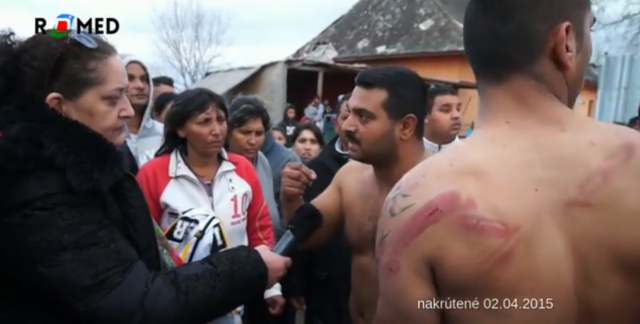Seven Years of Injustice for Roma in Moldava nad Bodvou
19 June 2020

Seven years ago today, sixty-five police officers armed with batons and dogs raided a Romani community on Budulovská Street in Moldava nad Bodvou, Slovakia. These police officers, dressed more like soldiers ready for a battle than as law enforcement, entered the Romani neighbourhood and beat men, women, and children indiscriminately. More than 30 people were wounded, who according to witnesses made no attempt to obstruct the police. The raid on the 19th June 2013, which was unjustified, disproportionate, and without a legitimate reason, has never been independently investigated. At a time when racialized police violence is being protested in cities across the world, Moldava nad Bodvou remains a potent symbol of police brutality against Roma in Slovakia.
It was by no means the first nor the last instance of severe police violence against an entire Romani community in the country. The raid was carried out as part of the so-called “Code 100” actions which punitively target Romani neighbourhoods in Slovakia on the pretext of police investigations into criminal activity. However, Moldava nad Bodvou was the first major court case which received such a high level of public scrutiny. Now, seven years later, it represents an opaque and unjust judicial system which has completely failed to provide justice for Roma.
Not only was the internal investigation into the actions of the police officers a farce, finding no wrongdoing on the part of the officers, but no further measures were taken after the case went public to ensure such interventions were not repeated in the future. In fact, six of the Romani residents who were beaten by police are now facing the third year of a trial for false accusations against the Slovak Police. It became very clear to the Romani litigants and activists involved in the case that justice would never be found in a Slovak court of law, so the case was finally brought to the European Court of Human Rights (ECtHR) in 2018.
Today the ERRC, and a coalition of Slovak NGOs involved in prosecuting the police action in Moldava nad Bodvou, have sent a letter to the new Minister of Interior, Roman Mikulec. The letter asks him to proactively address the case and take measures to ensure that similar failures are not repeated in the future. The organisations reminded him that Slovakia has not yet established an independent body to investigate police misconduct, something which was long-promised by his predecessors Denisa Saková and Robert Kaliňák.
Lýdia Šuchová, the President of the civic association Equity hopes that the Minister will do the right thing, without the prompting of the European Court. She said "we believe that the new minister will respond positively to our letter and demands, [mandatory use of police] cameras will be introduced, and a debate on what a truly independent oversight of the state bodies that are allowed to use force should look like. We want to believe that the state is capable of self-reflection, even without a decision of the European Court of Human Rights.”
The case before the ECtHR looms large over the Ministry of Interior as police violence against Roma has again made the headlines in recent months during the emergency lockdown measures brought about by the coronavirus pandemic. Violent incidents against Roma in Bardejov, Krompachy, and Bánovce nad Bebravou in the last few months demonstrate that this issue will not resolve itself without urgent action from the Minister of Interior. Meanwhile the clock is still ticking and an imminent judgment is expected from the European Court.
"The communication between the Strasbourg court and the Slovak Republic has now ended, and we are expecting the court will issue a judgment very soon.” said Michal Zálešák, the lawyer working on the case on behalf of the ERRC.
Soon can’t come soon enough for the Roma who have been denied justice for these past seven years. A positive judgment from the ECtHR would be a start and provide some measure of justice for these people. But real justice means more than compensation. Real justice would mean an end to the prosecution of the six Roma who are being accused of lying that police beat them for no reason. Real justice would mean the creation of an independent investigative body to make sure that police brutality against Roma is not swept under the carpet by an internal body in the Ministry of Interior. Finally, real justice would mean taking disciplinary action against those sixty-five police officers who attacked innocent people in Moldava nad Bodvou seven years ago. Because until this is done these officers, and others like them, will remain secure in their belief that they can enter any Romani neighbourhood they choose and maim people at will with complete impunity.




